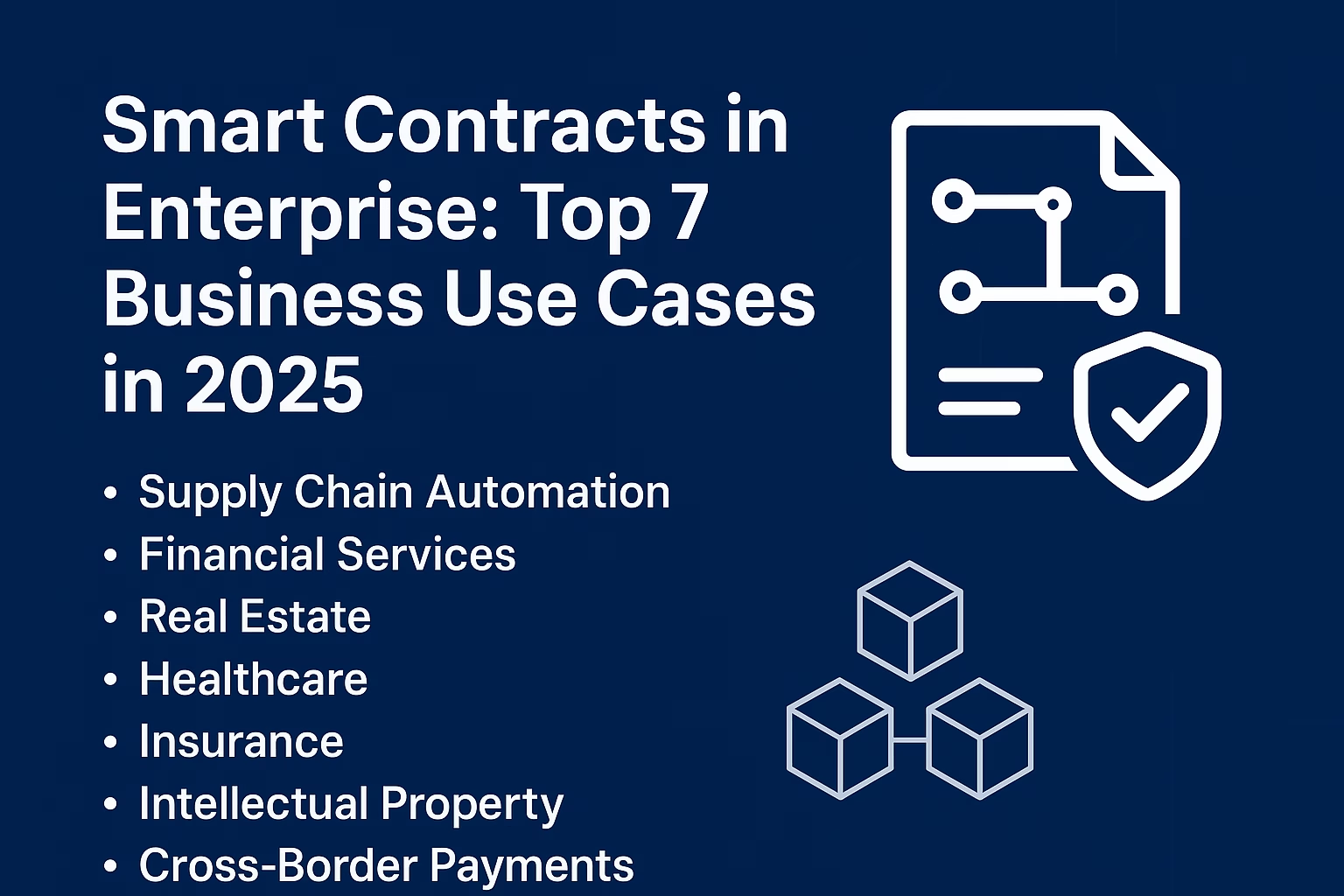
In 2025, businesses are unlocking a completely different level of automation and trustless transactions. Smart contracts are automated agreements that use blockchain technology to redefine the way businesses operate by removing the need for intermediaries while increasing transparency and trust. Regardless of whether you’re a business owner, enterprise architect, or technology strategist, it is important to understand the potential examples of smart contracts if you want to remain competitive in the changing landscape.
This article identifies what smart contracts are, why they are important, and the 7 best enterprise use cases for smart contracts in the year 2025 that are changing industries around the globe. Finally, we will also tackle the most common questions businesses have about smart contracts as adoption of the technology is gaining momentum.
Smart contracts are self-executing digital agreements stored on a blockchain. They contain predefined rules and automatically execute actions when those conditions are met — without human intervention.
Example: If you were an owner of a global supply chain, you could create a smart contract that would automatically trigger and release payment once the goods are delivered and the IoT sensors communicated and verified that the delivery was made. This provides a number of efficiencies like eliminating delays, decreasing human error, while simultaneously increasing trust between the stakeholders.
But to summarize some key attributes of smart contracts:
Key characteristics of smart contracts:
Businesses today are confronted with issues such as isolated data, inefficient processes and procedures, risk of fraud, and a lack of trust between partners.Smart contracts can alleviate these issues by:
As blockchain adoption quickly expands, Gartner estimates that by 2025, 30% of large enterprises will have implemented blockchain-based smart contract solutions to create better operational efficiency.
Let’s examine the ways in which businesses are utilizing smart contracts in various industries.
One of the most compelling examples is in supply chain automation. Smart contracts automate procurement, logistics, and delivery as everything is recorded on the blockchain.
Example Use Case:
Enterprise Benefits:
Smart contracts are transforming financial transactions by reducing the dependence on intermediaries like banks and clearing houses.
Example Use Case:
Enterprise Benefits:
Insurance companies are utilizing smart contracts to facilitate speedier claims settlement and reduce fraud risk.
Example Use Case:
Enterprise Benefits:
Companies involved in property and asset management can use smart contracts to handle transactions.
Example Use Case:
Enterprise Benefits:
Numerous creative industries utilize smart contracts to fairly ensure creators are paid when their work is sold, streamed, or utilized.
Example Use Case:
A music label uses a smart contract to pay artists a predetermined percentage every time a song is streamed or downloaded.
Enterprise Benefits:
Enterprises can utilize smart contracts powered by blockchain technology to enhance HR processes.
Example Use Case:
Enterprise Benefits:
In healthcare, high levels of security and data sharing transparency are critical. Smart contracts governing the sharing of patient data only with approved parties ensure all sharing of data is approved by the patient in a reasonable time frame.
Example Use Case:
Enterprise Benefits:
While there are many advantages of smart contracts, enterprises face a number of challenges:
To overcome challenges with smart contracts in an enterprise setting, enterprises should work with blockchain developers with smart contract experience, as well as conduct smart contract audits after the contract has been developed before deployed in an operational environment.
By 2025, smart contracts have matured from a blockchain buzzword into an enterprise-grade automation, transparency, and efficiency solution across industries. From supply chain management to carbon credit tracking and trading, self-executing contracts are ushering in new possibilities for multinational businesses.
Firms that embrace smart contracts early on will experience faster processing, cost savings, and heightened trust with partners and customers. Whether you are in finance, logistics, healthcare, or real estate, it is time to review potential smart contract use cases.
What is a smart contract in simple terms?
A smart contract is a self-executing program on a blockchain that automatically performs actions when predefined conditions are met.
Are smart contracts legally binding?
In many countries, yes. Jurisdictions like the U.S., U.K., and Singapore recognize blockchain-based contracts if they meet legal requirements.
Which blockchains are best for enterprise smart contracts?
Ethereum, Hyperledger Fabric, Polygon, and Avalanche are popular choices in 2025 for their scalability and security.
How secure are smart contracts?
They are highly secure but can be vulnerable to coding bugs. Regular auditing and testing are essential.
Can smart contracts be changed after deployment?
Most smart contracts are immutable, but some allow upgrades through governance mechanisms.
What industries benefit most from smart contracts?
Finance, supply chain, real estate, healthcare, and insurance are leading adopters.
How do smart contracts save money for enterprises?
By removing intermediaries, reducing paperwork, and automating workflows, they cut operational costs significantly.
Do smart contracts work with IoT devices?
Yes, IoT devices can act as data oracles, triggering smart contract execution based on real-world events.
What is the cost of deploying smart contracts?
Costs vary depending on the blockchain, complexity of the code, and gas fees. Private enterprise solutions may have lower costs.
How can enterprises get started with smart contracts?
Begin with a pilot project, partner with a blockchain development firm, and focus on a high-impact use case like supply chain or payments.
What industries benefit most from smart contracts?
Finance, supply chain, real estate, healthcare, insurance, and carbon credit markets are leading adopters.
How can enterprises get started with smart contracts?
Begin with a pilot project, partner with a blockchain development firm, and focus on a high-impact use case like supply chain, payments, or carbon credit trading.